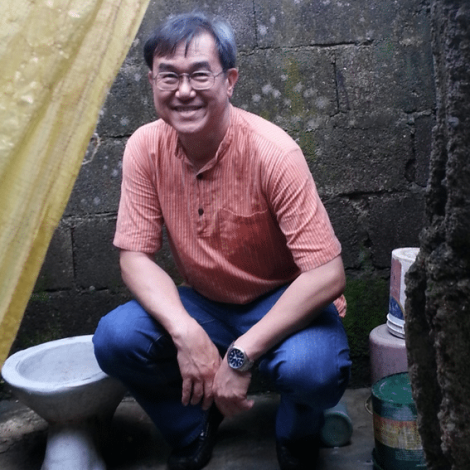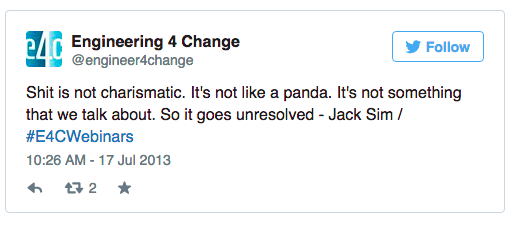Since 2001, Mr. Sim has taken to the world stage to break the poop-talk taboo. He founded the World Toilet Organization and has held World Toilet Fora and Summits in the world’s biggest cities.
Before his crusade, Mr. Sim was a self-made businessman in Singapore. He started his first business at age 24 and then founded 15 more in fields such as building materials trade, manufacturing, real estate, education and others. In 1997, he “quit the rat race,” as he says, extricated himself from his business responsibilities and devoted himself to full-time volunteerism in the social sector.
We asked Jack Sim five questions. (Plus a bonus question that we couldn’t resist.)
E4C: How did your friends and family react when you told them you are quitting business to promote toilets?
JS: When the recession struck in 1997 in Singapore, I had a streak of successful years in business which I started since 24. Suddenly, I realized that business is not always predictable and sometimes, you are not agile enough to react. It was also a humbling time for self-reflection. I told my wife that if we survive this recession, I’m not going back to gamble the second half of my life on the Rat-Race again. I waited till the end of the recession, return the businesses to profit and start selling them or closing some down. In the end, I reached a debt-free situation and still have one good business running and 5 properties on rental income. That was how I became financially independent and can devote working for the social sector for free for the last 16 years.
At the same time, at 40, there was also the question of what is life for? Wealth accumulation seems futile beyond our needs. Since I have only 14,600 days till expiry date at 80 years old, selling precious time to buy more money seems to me a loss-making exchange.
My wife is fully supportive. My kids gets teased at school that their father is cleans toilet. I told them the way to handle such teasing was to agree with them but to tell them that cleaning toilets is an important job.
I think having a father doing such work also shows them a role model how to lead a rich and fulfilling life.
At first, business friends thought I was trying yet another new idea to make money. They were surprised later that this was totally altruism. It took some many years to finally understand that quitting business was a very wise choice for me.
If I did not find my moral compass at that stressful time during the deep of the recession, I might have collapsed into depression having nothing worthy to contribute. When I discovered the toilet and sanitation agenda is neglected, I felt this is where I can contribute more than elsewhere.
E4C: You founded the World Toilet Organization 12 years ago. What is one of the promising trends in sanitation that you have seen in that time?
JS: I think that since people would not talk about toilets and sanitation, it was an embarrassing subject that I can turn into humor and mobilize the global media to in turn create a positive movement. I did not know how big it would become, but I just felt that this is going to be fun. I know we have to continue until everyone on Earth can have access to a clean and safe toilet anywhere at anytime.
E4C: And what changes would you like to see 12 years from now, in the year 2025?
JS: I think by 2025, toilets will be a common agenda and people will be able to speak about going to the toilet in daily, common language. As that happens, the demand for toilets and sanitation will become as common as the demand for cell phones and TV sets among the poor. Currently, cell phones and TV are higher priority than toilets. As people become aware that toilets are the norm, toilets will move up the priority ladder of needs and wants. I think it will be normal by 2025 for everyone to want to own a toilet. So those who still don’t have toilet will demand it as a top priority and they’ll get it in due course depending on their circumstances and the prevailing public policy.
E4C: What is one thing that people either don’t know, or don’t understand about sanitation?
JS: People think that all sanitation systems have a big sewer connection. In fact, only a minority of the world’s population has proper sewerage treatment plants. The rest are piped into the sea or river or lake. Sixty percent of the world’s population has no treatment and 40 percent of world’s population has no proper sanitation at all.
E4C: What mistake have you made that taught you a valuable lesson, and what did you learn from it?
JS: Don’t stay solely in the Rat Race. You can’t bring the money with you when you die. Life is an 80-year journey to death. So far, no one has survived. To live a rich fulfilling life, we need multiple dimensions. Love is the best reason for living: Love your family, society and love the people who are neglected. Do something useful while you are still alive.
Consumer culture asks you to buy things you don’t need, with money you don’t have, to impress the people you don’t like. If this is the kind of life you are leading, do you want to carry on like this?
E4C: Bonus question: What are you reading this week, and what book or article would you recommend that the rest of us read?
JS: The best book today to read is, ” One Man’s View of the World,” by Lee Kuan Yew. He is the Father of Singapore, 89 years old and straight talking. You’d be more prepared for the future if you read this book.


